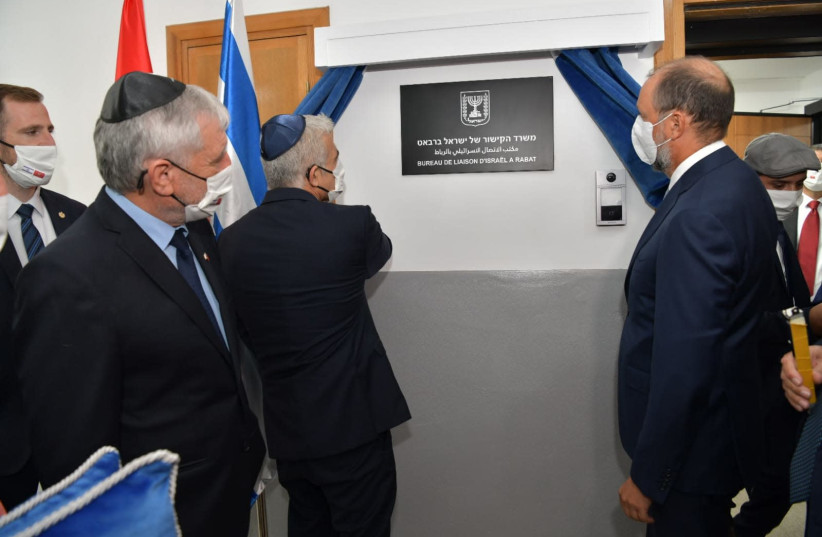As Israel’s foreign minister, Yair Lapid is generally considered a notable success. Proactive by temperament, he has seemed tireless in his efforts to improve Israel’s standing on the world stage. He had been in office only a month before the UK’s prestigious Financial Times headlined a story: “Lapid’s whirlwind tour shows a different Israel to the world.”
The Times continued: “In just four weeks in office, Yair Lapid… has spent much of his time overseas, signaling a determination to set a new tone in foreign relations.”
Lapid certainly hit the ground running. In those first weeks he opened the first Israeli embassy in the United Arab Emirates; flew to Rome for a meeting with US Secretary of State Antony Blinken; took a quick trip to Turkey; addressed the 26 European Union foreign ministers in Brussels in an effort, which proved successful, to improve Israel’s relations with Europe; and met with his Jordanian counterpart, Ayman Safadi, at a crossing point over the Jordan River.
Restoring trust and strengthening relations with Jordan was a high priority of the coalition government from the start. Throughout 2021, all of Israel’s senior leadership – including President Isaac Herzog; then-prime minister Naftali Bennett; Foreign Minister Yair Lapid, before becoming prime minister; and Defense Minister Benny Gantz – had meetings with Jordan’s King Abdullah II.
Following Lapid’s meeting with Safadi, the government announced it would double Israel’s committed allocation of water to Jordan under the 1994 peace treaty. It also set a target to increase Jordan’s export potential to the West Bank from $160 million to $700 million a year.

This first foray into strengthened Israeli-Jordanian collaboration was dramatically augmented in Dubai on November 22, 2021. On that day, ministers from Israel, Jordan, and the UAE signed a landmark energy-for-water deal. They agreed that Jordan will build a large solar power plant in the desert, financed by the UAE, which will be used to generate electricity for the Israeli market. In return, Israel will develop another desalination plant and supply even more water to Jordan.
Under the deal, the solar plant will produce 600 megawatts of solar energy to be exported to Israel at a price of $180 million, the proceeds to be shared between the UAE and Jordan. The deal calls for the Jordanian solar farm to be operational by 2026 and produce 2 percent of Israel’s energy by 2030. In exchange, Israel will send 200 million cu.m. of desalinated water to Jordan. Other issues on the bilateral agenda included joint tourism in the Gulf of Eilat-Aqaba, food security, agriculture and transportation links.
Making progress
AS ISRAEL’S foreign minister, Lapid maintained a punishing pace throughout 2021. In August, he was in Morocco, consolidating the kingdom’s signing of the Abraham Accords by reopening the Israeli Liaison Office in Rabat. In September, he was inaugurating the Israeli embassy in Bahrain and signing a list of new bilateral agreements.

In November, he was in London meeting Britain’s then-prime minister, Boris Johnson, and its foreign minister Liz Truss, signing an agreement binding Israel and the UK in an ever-closer trade relationship. He flew on to Paris to meet France’s President Emmanuel Macron to ensure that banking sanctions against Iran remained in place.
In January 2022, he joined Germany’s foreign minister, Annalena Baerbock, in ensuring the adoption by the UN of the Resolution against Holocaust Denial and Distortion. In March, he was in Romania, inaugurating an expedited aliyah process for Ukrainian refugees.
Later that month, he hosted a visit to Israel by Singapore’s foreign minister, Dr. Vivian Balakrishnan, who announced that after 53 years of ties with Israel, Singapore would open an embassy in Tel Aviv. Only a few days before the coalition government collapsed, Lapid was in Turkey, consolidating the improved relationship with Israel fostered by Turkish president, Recep Tayyip Erdogan.
One could only hope that the impetus Lapid had given to improving Israel’s foreign relations in general, and relations with Jordan in particular, would be maintained once he assumed the role of interim prime minster for the period leading to the general election, scheduled for November 1, 2022.
And so it has proved. At the weekly cabinet meeting on July 31, Prime Minister Lapid announced that Israel and Jordan are to revitalize, expand and accelerate the implementation of the “Jordan Gateway” project – the joint industrial zone between the State of Israel and the Hashemite Kingdom of Jordan. It was established in 2002 to facilitate the transport of products from and to America, Europe, the Middle East and the rest of Asia. The re-conceived Jordan Gateway industrial and employment park will be constructed in conjunction with the Emek Hama’ayanot Regional Council at the northern end of the Jordan Valley.
The idea of a joint industrial zone was first proposed during talks on the 1994 Israel-Jordan peace agreement, and the revitalized project was finally signed off at a meeting between Lapid and Jordan’s King Abdullah II in Amman in the last week of July 2022.
“Twenty-eight years since the peace agreement with Jordan,” said Lapid, “we are taking the good neighborly relations between our two countries another step forward. This is a breakthrough that will contribute greatly to developing and strengthening the region.” It will, he said, “increase employment in both countries, advance our economic and diplomatic relations, and enhance the peace and friendship between our two countries.”
These are worthy objectives, and wholly in line with those inherent in the Abraham Accords. In effect, Jordan is lining up alongside the UAE and Bahrain to capitalize on the benefits that follow from a flourishing cooperative relationship with Israel.
The writer is the Middle East correspondent for Eurasia Review. His latest book is Trump and the Holy Land: 2016-2020. Follow him at: www.a-mid-east-journal.blogspot.com
